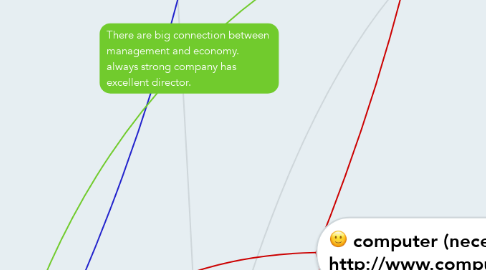
1. English words
1.1. analysing
1.1.1. to examine in detail in order to discover meaning, essential features,
1.2. colleagues
1.2.1. a fellow worker or member of a staff, department, profession,
1.3. communication
1.3.1. the act or an instance of communicating; the imparting or exchange of information
1.4. company
1.4.1. a number of people gathered together; assembly
1.5. crisis
1.5.1. a crucial stage or turning point in the course of something,
1.6. debts
1.6.1. something that is owed, such as money
1.7. distributors
1.7.1. a person or thing that distributes
1.8. founded
1.8.1. to set up or establish on a firm basis or for enduring existence
1.9. innovations
1.9.1. something newly introduced
1.10. motivation
1.10.1. the act or an instance of motivating
1.11. resign
1.11.1. to give up an office or position
1.12. achievement
1.12.1. something that has been accomplished, esp by hard work
1.13. corporate culture
1.13.1. the distinctive ethos of an organization that influences the level of formality, loyalty,
1.14. hierarchy
1.14.1. a system of persons or things arranged in a graded order
1.15. incentives
1.15.1. motivating influence; stimulus
1.16. remuneration
1.16.1. the act of remunerating
1.17. theories
1.17.1. to produce or use theories; speculate
1.18. wages
1.18.1. Compare salary payment in return for work or services
1.19. collaborating
1.19.1. to cooperate as a traitor, esp with an enemy occupying one's own country
1.20. conflics
1.20.1. a struggle or clash between opposing forces; battle
1.21. delegate
1.21.1. a person chosen or elected to act for or represent another or others, esp at a conference or meeting
1.22. downsizing
1.22.1. to reduce the operating costs of a company by reducing the number of people it employs
1.23. merger
1.23.1. the combination of two or more companies, either by the creation of a new organization or by absorption by one of the others
1.24. outsourcing
1.24.1. to subcontract (work) to another company
1.25. permission
1.25.1. authorization to do something
1.26. superior
1.26.1. greater in quality, quantity
1.27. takeover
1.27.1. the act of seizing, appropriating, or arrogating authority, control
1.28. tasks
1.28.1. a specific piece of work required to be done as a duty or chore
1.29. authority
1.29.1. the power or right to control, judge, or prohibit the actions of others
1.30. characteristics
1.30.1. a distinguishing quality, attribute, or trait
1.31. collectivist
1.31.1. a social system based on this principle
1.32. confrontation
1.32.1. . the act or an instance of confronting
1.33. diversity
1.33.1. the state or quality of being different or varied
1.34. globalization
1.34.1. the process enabling financial and investment markets to operate internationally, largely as a result of deregulation and improved communications
1.35. individualist
1.35.1. a person who shows independence and individuality in his behaviour, opinions, or actions
1.36. localization
1.36.1. to make or become local in attitude, behaviour
1.37. logical
1.37.1. relating to, used in, or characteristic of logic
1.38. mulinational
1.38.1. (of a large business company) operating in several countries
1.39. particularist
1.39.1. exclusive attachment to the interests of one group, class, sect
1.40. stereotype
1.40.1. a method of producing cast-metal printing plates from a mould made from a forme of type matter in papier-mâché or some other material
1.41. applicants
1.41.1. a person who applies, as for a job, grant, support, etc; candidate
1.42. candidate
1.42.1. person seeking or nominated for election to a position of authority or honour or selection for a job, promotion
1.43. sacked
1.43.1. a large bag made of coarse cloth, thick paper, etc, used as a container
1.44. headhunters
1.44.1. someone who recruits executives for employmen
1.45. junior
1.45.1. lower in rank or length of service
1.46. position
1.46.1. the place, situation, or location of a person or thing: he took up a position to the rear
1.47. psychology
1.47.1. , sometimes concerned with the methods through which behaviour can be modified
1.48. quit
1.48.1. to depart from; leave: he quitted the place hastily
1.49. recruiters
1.49.1. to enlist (men) for military service
1.50. referee
1.50.1. a person to whom reference is made,
1.51. testimonial
1.51.1. a formal statement of truth or fact
1.52. resume
1.52.1. to begin again or go on with (something adjourned or interrupted)
1.53. senior
1.53.1. higher in rank or length of service
1.54. shortlist
1.54.1. a list of suitable applicants for a job, post,
1.55. vacancy
1.55.1. the state or condition of being vacant or unoccupied; emptiness
1.56. CEO
1.56.1. abbreviation of chief executive officer.
1.57. directors
1.57.1. a person or thing that directs, controls, or regulates
1.58. goals
1.58.1. the aim or object towards which an endeavour is directed
1.59. management
1.59.1. the technique, practice, or science of managing, controlling or dealing with: anger management
1.60. manager
1.60.1. a person who directs or manages an organization, industry, shop,
1.61. modify
1.61.1. to change the structure, character, intent,
1.62. resources
1.62.1. capability, ingenuity, and initiative; quick-wittedness: a man of resource
1.63. scientific
1.63.1. ( prenominal ) of, relating to, derived from, or used in science: scientific equipment
